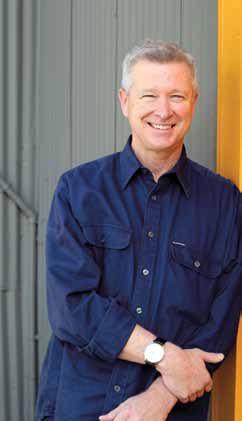Campus News
Philanthropy Focus / Stephen Bruce gives back by looking to the future
For the past two years, Bruce (Cowell ’79, economics) has brought international scholars to UCSC to discuss the global economic crisis as part of the Bruce Initiative on Rethinking Capitalism.

How can a robust global economy fail? And what are the factors that can bring it crashing down?
Three decades later, the political and economic landscape of the world had changed dramatically. The global economy had expanded beyond Bruce’s wildest imagination. Meanwhile, intangible securities known as derivatives were playing a much more decisive role in economic expansion. The excesses of communism had been dealt with, and Bruce realized it was time to deal with the excesses of capitalism and the challenges of fairness and justice.
With these factors in mind, Bruce posed his most ambitious question to date: How can the latest economic crisis challenge our assumptions about capitalism? For the past two years, Bruce (Cowell ’79, economics) has brought international scholars to UCSC to discuss the global economic crisis as part of the Bruce Initiative on Rethinking Capitalism. The conference returned to campus April 7–9.
It makes perfect sense that the campus that inspired him is now “neutral territory” where professors from different universities are happy to put aside rivalries, shake hands, and talk. The multidisciplinary approach of the campus’s curriculum also makes it the perfect place to host an eclectic mix of scholars whose disciplines include economics, accounting, finance, and political science as well as anthropology, geology, literature, art, and public policy.
“We could have easily done it in San Jose, but we wanted to have it in Santa Cruz,” Bruce said. “We wanted to have the students involved.”
The conference is only the latest in Bruce’s collaborations with his alma mater. Bruce increased his involvement with UC Santa Cruz after he sold his successful asset management firm five years ago.
His contributions have included initiatives as diverse as helping the Center for Integrated Water Research bring a reverse osmosis water treatment unit to the city of Watsonville to sponsoring a two-year lecture series as part of the South Asia Studies Initiative and supporting aspiring math and science teachers along with promising graduate students in politics. He is even working with the Center for Games and Playable Media to create a video game focusing on environmental issues and the ocean.
Bruce’s first creation was the establishment of the Mark Bruce Fellowship for Math and Science Teachers at UCSC in honor of his brother, who died in the World Trade Center attacks on 9/11. His support includes the purchase of classroom supplies in under-resourced schools in Watsonville and Salinas.
Bruce also established the Robert Meister Scholars Fund to support graduate students in politics and bring the “best and the brightest” to UCSC. His $250,000 gift in 2006 funds a $50,000 fellowship that has been awarded three times so far.
To date, Bruce has given more than $1 million to UCSC.
Along the way, Bruce has contributed yet another valuable resource: his time and expertise. For three years he served as chair of the Board of Councilors, an advisory group to Division of Social Sciences Dean Sheldon Kamieniecki.
Now Bruce is helping to guide the campus’s comprehensive campaign effort while serving on the advisory board for the Santa Cruz Institute for International Economics, the South Asia Studies Initiative, and the Sury Initiative for Global Finance and International Risk Management.
His advice for other alumni: Re-establish your old links to the campus. Rekindle old mentorships. If possible, show up there in person. Get involved. Contribute in a way that will drive and inspire future generations.
“They should hunt down old professors, talk to students, fund a scholarship, or fund a speaker series,” Bruce said. “It’s so easy to get engaged.”